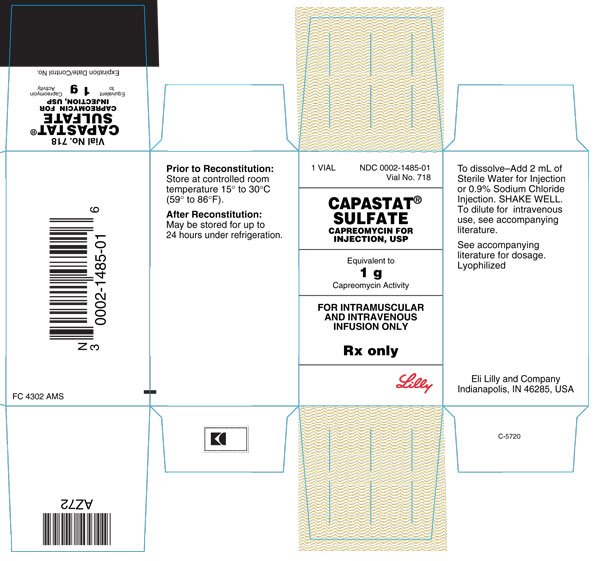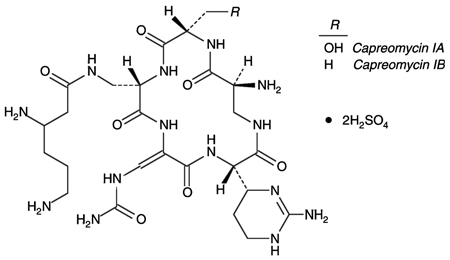Capastat Sulfate | Capreomycin Sulfate Injection, Powder, For Solution while Breastfeeding

What is Capastat Sulfate | Capreomycin Sulfate Injection, Powder, For Solution used for?
Is using Capastat Sulfate | Capreomycin Sulfate Injection, Powder, For Solution safe or dangerous while breastfeeding?

Nursing Mothers It is not known whether this drug is excreted in human milk. Because many drugs are excreted in human milk, caution should be exercised when Capastat Sulfate is administered to a nursing woman.
Capastat Sulfate | Capreomycin Sulfate Injection, Powder, For Solution Breastfeeding Analsys
Capreomycin sulfate while Breastfeeding
Low RiskCAS Number: 1405-36-3
Systemic absorption is minimal.
Capastat Sulfate | Capreomycin Sulfate Injection, Powder, For Solution Breastfeeding Analsys - 2
Capreomycin sulfate while Breastfeeding
CAS Number: 11003-38-6
Developmental problems have been reported in two infants exposed to capreomycin in breastmilk; however, their mothers were also exposed to several drugs during pregnancy and during breastfeeding, so the problems cannot necessarily be attributed to capreomycin. Because capreomycin is not orally absorbed it is unlikely to adversely affect the breastfed infant. If capreomycin is required by the mother, it is not a reason to discontinue breastfeeding.

I am nursing mother and I have already used Capastat Sulfate | Capreomycin Sulfate Injection, Powder, For Solution, what should I do?
During whole lactation period you shall first discuss with your doctor and then together you shall decide whether you shall take that drug or not however if you have already taken Capastat Sulfate | Capreomycin Sulfate Injection, Powder, For Solution then you shall inform your doctor, But you should not be worried too much as Capastat Sulfate | Capreomycin Sulfate Injection, Powder, For Solution comes in category of low risk drug.
My doctor has prescribed me Capastat Sulfate | Capreomycin Sulfate Injection, Powder, For Solution, what should I do?
Though Capastat Sulfate | Capreomycin Sulfate Injection, Powder, For Solution dose not comes in category of safe drugs rather it comes in category of low risk but if your doctor is aware that you are breastfeeding your baby and has still recommended it then its advantages must be outweighing the risks.
If I am using Capastat Sulfate | Capreomycin Sulfate Injection, Powder, For Solution, will my baby need extra monitoring?
Not much
Who can I talk to if I have questions about usage of Capastat Sulfate | Capreomycin Sulfate Injection, Powder, For Solution in breastfeeding?
US
National Womens Health and Breastfeeding Helpline: 800-994-9662 (TDD 888-220-5446) 9 a.m. and 6 p.m. ET, Monday through Friday
UK
National Breastfeeding Helpline: 0300-100-0212 9.30am to 9.30pm, daily
Association of Breastfeeding Mothers: 0300-330-5453
La Leche League: 0345-120-2918
The Breastfeeding Network supporter line in Bengali and Sylheti: 0300-456-2421
National Childbirth Trust (NCT): 0300-330-0700
Australia
National Breastfeeding Helpline: 1800-686-268 24 hours a day, 7 days a week
Canada
Telehealth Ontario for breastfeeding: 1-866-797-0000 24 hours a day, 7 days a week
